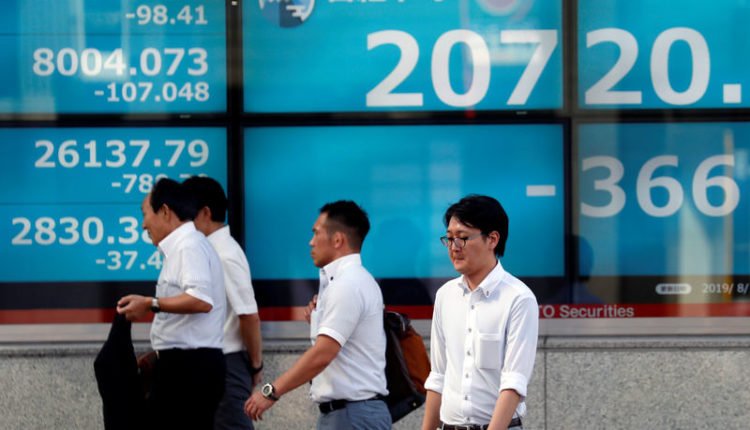Global stocks deepen losses as U.S. brands China currency manipulator
By Shinichi Saoshiro
TOKYO (Reuters) – Global stocks extended their already substantial losses and the offshore yuan hit an all-time low on Tuesday after Washington designated Beijing a currency manipulator in a rapid escalation of the U.S.-China trade war.
U.S. Treasury Secretary Steven Mnuchin said on Monday the government had determined that China is manipulating its currency, and that Washington would engage the International Monetary Fund to eliminate unfair competition from Beijing.
The Trump administration’s dramatic move against China hastened the risk aversion seen in global markets this week. On Monday, China let the yuan slide in response to the latest U.S. tariffs, which are expected to further aggravate trade tensions between the world’s two largest economies.
MSCI’s broadest index of Asia-Pacific shares outside Japan (MIAPJ0000PUS) fell 0.75% to its lowest since January.
Japan’s Nikkei (N225) shed 2.7%, Australian stocks (AXJO) fell 2.6% and South Korea’s KOSPI (KS11) slid 1.5%.
“Following the latest development in the U.S.-China trade war, all the economic views and moves in the currency and equity markets are driven by a ‘risk off’ mentality which in turn is boosting bonds,” said Kota Hirayama, senior emerging markets economist at SMBC Nikko Securities.
“The fact that U.S. yields are falling sharply even though Federal Reserve Chairman Jerome Powell did not signal further easing explains it all.”
Graphic: Asian stock markets – https://tmsnrt.rs/2zpUAr4
S&P 500 futures (ESc1) fell 1.3% in early Asian trade. Wall Street’s major indexes already posted their biggest percentage drop of the year on Monday on fears of escalation in the U.S.-China trade war.
MSCI’s All Country World Index (MIWD00000PUS), which tracks shares in 47 countries, extended last week’s slide and has slumped 2.5% to a two-month low on Monday.
China’s offshore yuan stretched the previous day’s big slide and weakened to 7.1288 , a fresh record low since international trading on the Chinese trade began in 2010.
The yen, a perceived safe-haven in times of market turmoil and political tensions, was up 0.1% at 105.850 per dollar after touching a seven-month high of 105.520
Investor demand for other safe-havens such government bonds also remained high as risk aversion gathered momentum.
The 10-year U.S. Treasury yield (US10YT=RR) extended sharp falls overnight and declined to 1.672%, its lowest since October 2016.
By Shinichi Saoshiro
TOKYO (Reuters) – Global stocks extended their already substantial losses and the offshore yuan hit an all-time low on Tuesday after Washington designated Beijing a currency manipulator in a rapid escalation of the U.S.-China trade war.
U.S. Treasury Secretary Steven Mnuchin said on Monday the government had determined that China is manipulating its currency, and that Washington would engage the International Monetary Fund to eliminate unfair competition from Beijing.
The Trump administration’s dramatic move against China hastened the risk aversion seen in global markets this week. On Monday, China let the yuan slide in response to the latest U.S. tariffs, which are expected to further aggravate trade tensions between the world’s two largest economies.
MSCI’s broadest index of Asia-Pacific shares outside Japan (MIAPJ0000PUS) fell 0.75% to its lowest since January.
Japan’s Nikkei (N225) shed 2.7%, Australian stocks (AXJO) fell 2.6% and South Korea’s KOSPI (KS11) slid 1.5%.
“Following the latest development in the U.S.-China trade war, all the economic views and moves in the currency and equity markets are driven by a ‘risk off’ mentality which in turn is boosting bonds,” said Kota Hirayama, senior emerging markets economist at SMBC Nikko Securities.
“The fact that U.S. yields are falling sharply even though Federal Reserve Chairman Jerome Powell did not signal further easing explains it all.”
Graphic: Asian stock markets – https://tmsnrt.rs/2zpUAr4
S&P 500 futures (ESc1) fell 1.3% in early Asian trade. Wall Street’s major indexes already posted their biggest percentage drop of the year on Monday on fears of escalation in the U.S.-China trade war.
MSCI’s All Country World Index (MIWD00000PUS), which tracks shares in 47 countries, extended last week’s slide and has slumped 2.5% to a two-month low on Monday.
China’s offshore yuan stretched the previous day’s big slide and weakened to 7.1288 <cnh=d4>, a fresh record low since international trading on the Chinese trade began in 2010.
The yen, a perceived safe-haven in times of market turmoil and political tensions, was up 0.1% at 105.850 per dollar after touching a seven-month high of 105.520.
Investor demand for other safe-havens such government bonds also remained high as risk aversion gathered momentum.
The 10-year U.S. Treasury yield (US10YT=RR) extended sharp falls overnight and declined to 1.672%, its lowest since October 2016.

